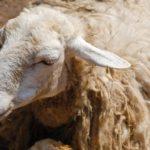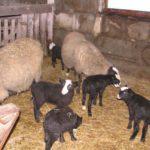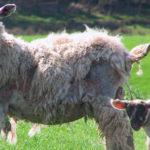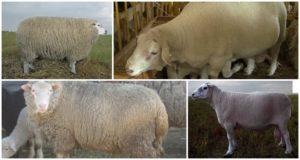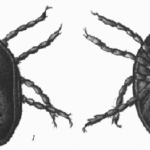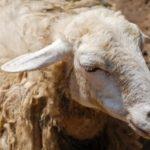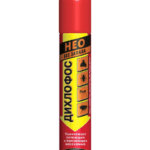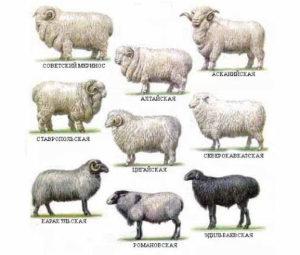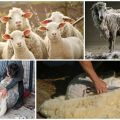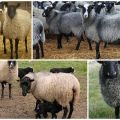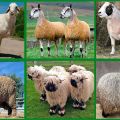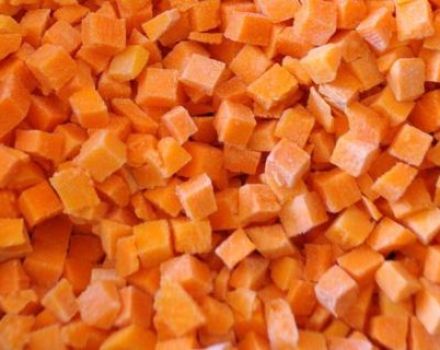How to treat sheep from ticks and lice, drugs and folk remedies
Long, thick wool of sheep is not only body protection, but also habitat for various species of ticks. Parasites can multiply on animals in considerable numbers, on adults and lambs, sometimes causing irreparable harm. To cure animals or prevent the appearance of parasites, the breeder needs to know how to treat sheep from ticks, what drugs and folk remedies.
How parasite infestation occurs
Mites appear in sheep with the beginning of the warm season. Parasites wait for victims on the grass in the pasture. Animals can also become infected by contact with individuals already having parasites. This is how lambs and young animals become infected. The tick saliva contains anesthetic substances that make the moment of the bite insensitive and invisible to animals. Several types of mites can live on sheep's wool at once.
Most often, ticks can be found on those animals that live in improper conditions: in dirty, unclean rooms. Individuals who do not care for their fur, do not feed animals correctly, do not treat diseases that weaken immunity and health are sick.
Symptoms of tick and lice infestation
It is possible to determine that sheep are infected with ticks by such signs as severe itching (animals begin to rub against objects, bite themselves in irritated places). Over time, the wool falls off, falls out. Bare areas may form, the skin on them will be reddened, rough, scratched. As a result of scabies, adult animals and lambs gradually lose their appetite, become exhausted, and individual individuals may die.
Ticks multiply quickly and can cover the body of the animal, which takes relatively little time.
Chronic tick infestation can also occur in lambs, young sheep also lose weight, do not grow, and their wool falls off. Since the heat acts negatively on ticks, in summer they hide in the folds of the skin of sheep and rams, and the disease becomes chronic.
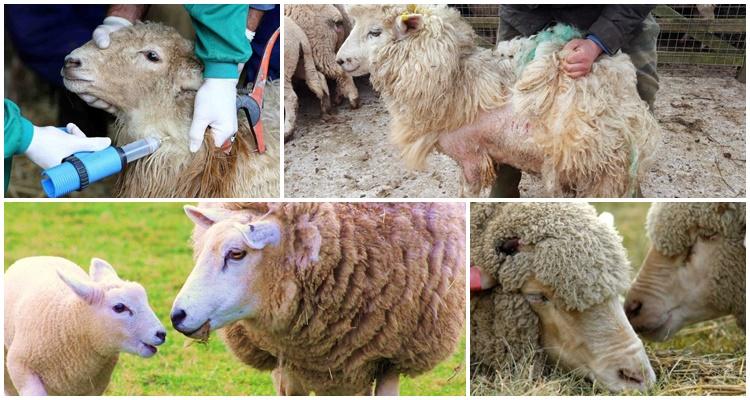
Tick control methods
After the reason is established, you need to immediately begin to destroy the ticks. This can be done by processing with synthetic veterinary drugs or folk remedies.
Contact methods
The principle of their action is that the drug is applied to the skin and contacts directly with parasites. Contact agents are used externally only. The choice depends on the season. So, in the summer it is easier to redeem animals in drug solutions. Before that, you need to cut your hair. The treatment is carried out with drugs based on diazinon.Dissolve the powder in water and bathe the sheep there for 0.5-1 minutes. Another treatment is done after 2 weeks. When diluting, you must observe the dosage and the rules for preparing the solution.
In winter, they are treated with sprays and powders. The preparations are applied in places where animals cannot reach, on a clean and dry skin surface. A 2-3-time treatment is carried out with an interval of 1.5-2 weeks.
Injections
If the usual treatment for ixodid and other ticks does not give an effect, drugs are used that are injected into the animal's body using injections. They use such means as "Ivermek", "Iverlong" (based on ivermectin). Usually a one-time treatment with Ivermek (0.2 ml per 10 kg of sheep weight) is enough for ticks to disappear. Such drugs can be treated both in summer and in winter.
Traditional methods
Safe traditional methods are often used by farmers as medicine for adult animals and lambs. If a tick is found, it cannot be torn off the skin, you should drip oil on it, and after a while it will fall off by itself. The animals are also treated with aromatic oils of geranium and lavender. Drops are applied to the sheep's body area, especially behind the ears and in the groin. Can be spread with a mixture of vegetable oil and tar, machine oil. They are applied in stripes throughout the body of the animal.
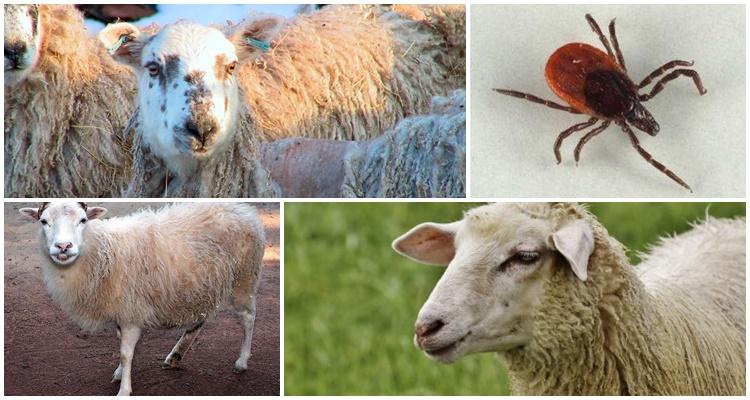
How to get rid of lice in sheep
In addition to ticks, lice can also be difficult for sheep to get rid of. For their destruction, preparations in the form of powders, aerosols and injections have been developed and are used. It is required to carry out at least 2 treatments, since the drugs act on adults and larvae, while the eggs remain alive. After a while, a new generation of parasites emerges from them.
Lice can appear in sheep at any time of the year, so animals should be examined at all times. The harm that they bring will not lead to death, but will also reduce the productivity of the sheep. Parasites appear in those individuals that live in insufficiently cleaned premises, which is why the coat is not in the best condition. Infection occurs with crowded content; animals are infected less often on grazing.
Signs of lice in sheep are itching, biting, and anxiety displayed by infected animals. If you look closely at the skin during examination, you will notice that there are combed and reddened areas. Lice and nits can be seen on the coat.
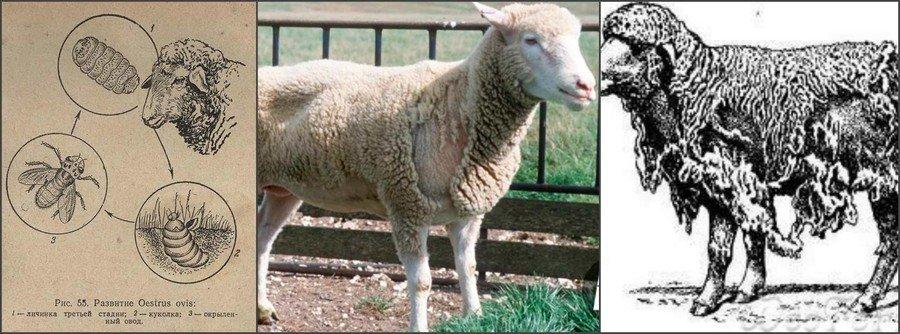
Powders
"Deltamethrin" in powder is used for external treatment. Spread evenly over the area of the sheep's body, rubbing slightly into the skin. Exceptions are mucous membranes. To process the entire body, you need to take 1 g for every 5 kg of mass. The second treatment with the drug is done after 12-14 days.
Aerosols
Means in the form of aerosols are convenient to use if there are few animals on the farm and you can pay attention to each. The drug, for example, "Extrazol M", "Bars", "Akrodeks", is applied to the skin where the sheep cannot lick it off. In 5-7 sec. you need to process 10 cubic meters. see animal bodies. In total, you need to spend 2-3 sprays with an interval of 10-12 days. Aerosols can also be used to treat rooms where sick individuals are kept, their feeders, care items, inventory. In addition to these drugs, Insectol, Diazinon, Dichlorvos are used.
Folk recipes
You can try to remove lice by treating the skin with ash or pyrethrum, a solution of vinegar or kerosene, fresh wormwood, tar. However, in most cases, they are ineffective or effective only if there are few lice.
What is the danger of parasites
Ticks not only draw out nutrients from the sheep's body, thereby weakening them, but also carry infectious diseases.Animals infected with ticks and lice give less milk, their wool quality deteriorates sharply. With a strong invasion, anemia may develop, often concomitant diseases, for example, infections or helminthiasis.
The skin at the bite sites can become inflamed, thickened and infected, the hair falls out, and reddened and combed skin is visible under it.
Parasites can be dangerous to humans, so everyone who works with sheep needs to be especially careful in this regard.
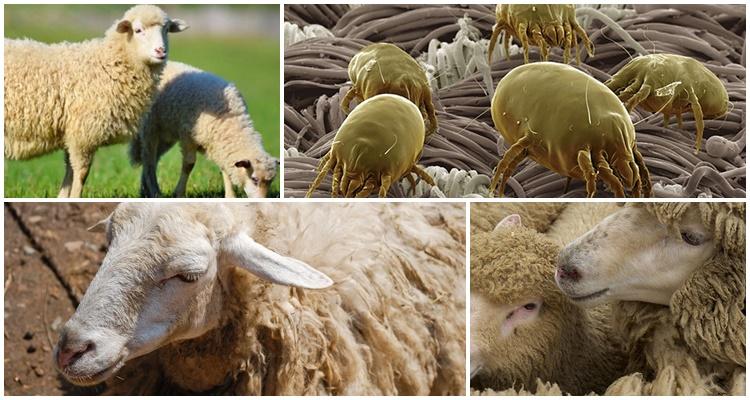
Preventive actions
In order not to treat sheep for ticks, care must be taken to reduce the likelihood of parasite infestation. Firstly, you need to carefully examine the surface of the skin and coat from time to time in order to detect the presence of parasites in time. This is especially true in the spring, during the activation of ticks. If they are found on any individual, you need to immediately separate it from the rest, transfer it to a separate room. You can return back only after a complete cure.
Secondly, to treat not only the infected animal with drugs, but also prophylactically all livestock. Clear the stall of bedding and manure, burn wool sheared from sick sheep. Treat the sheepfold with creolin, chlorophos, lysol, repeat after 2 weeks to minimize re-infestation by the next generation of lice. When buying new individuals, inspect their wool, quarantine for a while.
Any domestic sheep can become infected with ticks and lice. This can happen in pasture or after contact with sick animals. Treatment for parasites - treatment with anti-acaricidal veterinary drugs. Not only infected individuals are required to undergo processing, but also everyone else on the farm. Untreated animals reduce productivity, can get infectious diseases or even die.
